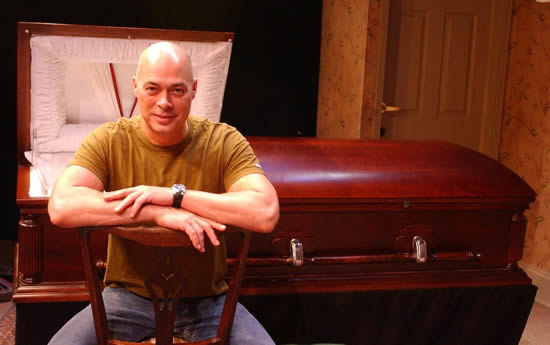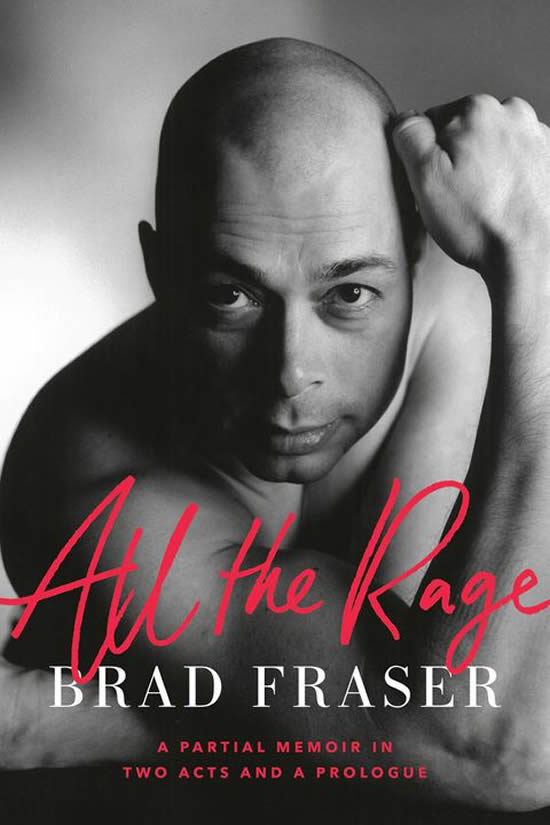
|
Talking about a decade of kudos and AIDS and laughter and plays, celebrated Toronto playwright Brad Fraser rages against the dying of the bright lights
By Bert Archer Special to the Star
Sat., May 15, 2021

His early influences were Peter Gabriel and Bruce Springsteen. He grew up poor, with profoundly unsupportive parents, and he didn’t go to university. When he’d had enough success to be interviewed, he said — in these very pages — that though he thought government grants were great, writers should really find a commercially viable audience. He survived physical, emotional, and sexual abuse, but was more interested in writing from it than about it, more interested in the places it elbowed him into than in the trauma itself. He had sex with men and women, and over time increasingly men, but kept on making most of his characters not-gay, while making them all distressingly sexual. His subject matter was lurid, but his quippiness was polished to a neo-Quentin Crispiness that critics literally did not know what to do with, but people loved. He wrote prosthetic erections and concentration camp newsreel backdrops — in the same play — and didn’t see a thing wrong with it.
Brad Fraser was never going to make it in Canada, never going to make it in Toronto.
And then he did.
Casey House, which opened its doors in 1988, is currently undergoing a massive expansion that will see it better equipped to treat patients like Kaighin — people who have beat the odds due to advancements in anti-retroviral therapy.
He was, by several metrics, the biggest English Canadian playwright from about 1989, when “Unidentified Human Remains and the True Nature of Love” was premiering in various forms across the country, to about 1998, when he did that thing with the hard-ons and the Holocaust in a play called “Martin Yesterday,” which was about neither hard-ons nor the Holocaust, and another local paper ran a piece about him under the headline, “Brad Fraser: Yesterday’s Man.”
Ten years.
Ten years during which he also wrote “Poor Super Man” — which both anticipated the cultural obsession with mainstream comics by a couple of decades and was one of the great dramas of the first age of AIDS — and also got on pretty much everybody’s tits.
It’s almost too neat a time frame, too convenient an arc. And it’s made even more unlikely by a story about a warning he got from his boyfriend when he was getting his first taste of real success about how fleeting it could be. “Just give me 10 years,” he said. “That’s all I ask.”

It’s a story he tells in his new memoir, “All the Rage,” and you’d be forgiven for thinking it’s a little too dramatically foreshadowing, a little too tidy.
Except this is not a tidy story. There is no arc here, and what’s there certainly does not bend towards justice. Relationships begin, fizzle, start up again, get redefined, conclude unsatisfyingly. No family issue is ever resolved, a hero dies way too randomly in a ridiculous house fire.
And that boyfriend with the warning? A straight guy. Not closeted, not bi. Straight-up straight, who just loved Brad. Nobody got it at the time, including them, and you’re probably not buying it now. But it’s a relationship that’s at the core of this story, and of the section of Fraser’s career he deals with in what may end up being Volume I of the Life of Fraser (he’s done a lot since, just very little of it here), which he brings to an admittedly neat close on New Year’s Eve, 1999.
“We were a straight man and a gay man trying to find a way to have a relationship which on certain levels worked really beautifully,” he says, “and on other levels didn’t work at all, and I think we both knew at the beginning that this wasn’t going to be (a) ‘we’re together forever kind of relationship’ and we never really talked in those terms.”
He’s talking to me by phone from his apartment in Toronto, where he’s now lived, more or less, for 30 years.
It’s a tough relationship to get if you think in terms of sexual identity rather than affectionate reality, in precisely the same way that Fraser’s theatrical work is hard to get if you think surfaces don’t necessarily conceal depths but can actually contain them, or that radical and mainstream are mutually exclusive.
But this book is not about his plays, though we do get lots of great material about how they were written, developed, cast and produced. This book is about the people in his life, and because he had sex with men, and worked with and loved other men who had sex with men, and because he was born in 1959, which made him 22 in 1981, this is a book about how almost all of those men died while he was writing these plays.

“I often go into the U of T and various universities where they study “Poor Super Man” and talk about what those years were like,” he says, “and it seems to me that, even the young queer people I meet now, they don’t really have any idea of what really went on and never to my knowledge had a real Canadian version of those years.”
And though the story about pre-famous Keanu Reeves being cast in one of his first plays, “Wolf Boy” (and bombing), or lines like “The annual arrival of the Ice Capades tour was highly anticipated by local tops in the same way grizzlies anticipate the spawning of salmon,” are individually worth the price of admission, it’s the death that stays with you. It haunts this book like it haunted the streets and bars and bedrooms of Toronto in the ’80s and ’90s. Everyone had it, and if you didn’t have it, you were going to get it. Sex equalled death and it twisted everything it didn’t kill. It’s a time we couldn’t grasp then, and mostly still don’t have a handle on now, except, possibly, glancingly, through work like Fraser’s, both then and now.
In this, he may be part of a slowly rising tide, along with David France’s How to Survive a Plague and Russell Davies’ It’s a Sin, of a long overdue — or, who knows, maybe right on time — cultural reconnection with that terrible, beautiful, terrible time.
“Sometimes we need time to recover from an event,” Fraser says. “That’s why we don’t have a lot of really great 9-11 pieces of art in the world yet; everything that they’ve tried to do has kind of bombed, and I think it’s because people don’t want to hear about it, they don’t want to face it.”
I think it’s a good time to face it, and if you’re Canadian, especially if you’re in Toronto — and liking Peter Gabriel couldn’t hurt — this is the place to start.
###
Source: Toronto Star
"Reproduced with permission - Torstar Syndication Services"
Toronto Star
For more HIV and AIDS News visit...
Positively Positive - Living with HIV/AIDS:
HIV/AIDS News
|